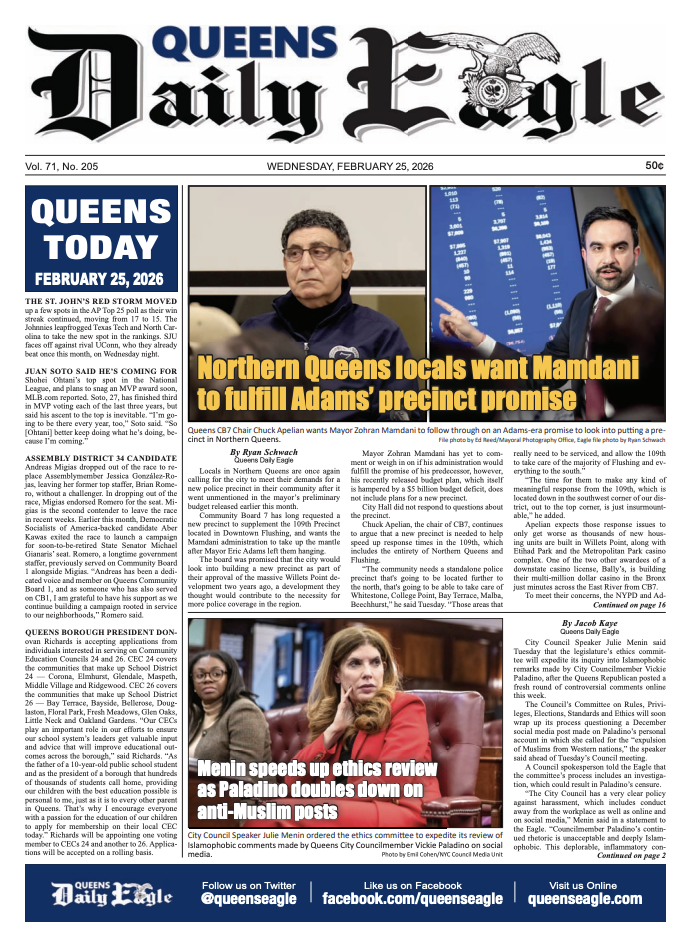Residents denounce ‘walking while trans’ ban at Jackson Heights town hall
/Activists at State Sen. Jessica Ramos’ town hall in Jackson Heights discussed sex work decriminazation and cannabis legalization on Thrusday night. Photo courtesy of Ramos’ office.
By Victoria Merlino
The impact of a state law that advocates say criminalizes “walking while trans” was brought into stark relief on Thursday night at a Jackson Heights town hall, as transgender residents shared their experiences being profiled because of their clothing, their gender identity or where they happened to be walking at night.
Section 240.37 of the state penal code grants police the ability to arrest people for allegedly loitering “for the purpose of engaging in prostitution.” In practice, advocates say, the law’s wording is too vague, and opens the door for police to profile transgender women of color for arrests as they wait for the bus or walk down the street wearing certain clothing or near LGBTQ bars.
Though prostitution-related arrests declined overall in 2018, loitering arrests increased, with more than half occurring in Queens, and many of those occuring in Jackson Heights and Corona.
State Sen. Jessica Ramos, a major advocate for sex work decriminalization herself, hosted the town hall.
“What all of this is about is harm reduction. What we want is to make sure all of our neighbors are safe,” Ramos said. “I realize that drugs and sex are things that we often have swept under the rug in our community, except for complaining about aesthetics — that it doesn’t look good, or that people don’t want their children seeing that.”
She continued, saying that as a mother of two children living off of Roosevelt Avenue, she would often get “interesting” questions from her children about the neighborhood.
“To me, it’s very important that we have very straightforward conversations with our children and that they understand that there are all sorts of people that are our neighbors,” Ramos said.
Make the Road New York organizer Bianey Garcia and activist Joselyn Castillo both said they had been profiled by police while just walking down the street, because they are transgender women.
One night, Castillo told the audience, she tried to go to the pharmacy in the area with her brother, who was feeling ill. Because it was late at night, she was stopped by a police officer, who thought that she was performing sex work and her brother was her customer. She had to prove to the officer that they were brother and sister, so that she would not be arrested and deported.
“After 10 p.m., [Castillo] can’t walk on Roosevelt Avenue because police officers are going to assume that she is doing sex work,” Ramos said, translating for Castillo, who was speaking in Spanish.
Jared Trujillo, the president of the Association of Legal Aid Attorneys and a panelist, said that many people in Jackson Heights are arrested for “loitering for the purposes of prostitution.”
“If you look at where it is in the penal law, it’s not where the other sex work-related statues are, and that’s for a reason. That’s because it isn’t sex work,” he said. “It’s people hailing down an Uber, smoking a cigarette, waiting for a friend … walking home after hanging out. It’s people that just simply have the audacity to exist in a public space.”
Former Queens district attorney candidate Tiffany Cabán, who was also a panelist, stressed the importance of supporting sex workers.
“Queer and especially BIPOC [black, indigenous and people of color] queer lives are at stake here,” she said. “We’re talking about people who are at the margins of the margins … and how we need to show up for them.”
In June 2019, the NYPD updated its patrol guide language to block arrests officers based on a person’s gender or gender representation, location, clothing or arrest history following a lawsuit settlement, though advocates are still pushing to have the whole law repealed.
The New York City Bar Association became the latest organization to call for a repeal of the law on Feb. 4, following the lead of the Brooklyn and Manhattan district attorneys, and the coalition of activist groups Decrim NY.




